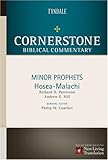
This is one of the most recent additions to the Bible Speaks Today series, and covers two books that fall into the post-exilic time-frame. Fyall recognizes that Ezra and Haggai are often neglected in favour of the slightly more accessible account of Nehemiah, and the more vivid prophecy of Zechariah. Nevertheless, he is determined to demonstrate to us that both books have a message for us today.
He identifies the main themes of Ezra as: God, the worship of God, the people of God, and Scripture and prayer. Its ongoing relevance is that it demonstrates that God never abandons his purpose or gives up on his people, but gives light for their guidance.
His approach is to work through the text, often making points of application along the way, but then a few pages at the end of each chapter are deliberately focused on what the contemporary message for the church is. Many of these points centre on the importance of the Word of God, the presence of God and the holiness of God.
The commentary on Haggai presents him as a prophet who had to confront a people like the church at Laodicea – tepid and complacent. Haggai’s style is blunt and succinct, with his prophecy a mixture of encouragement and rebuke. The temple for Haggai is the visible sign of God dwelling amongst his people by his Spirit. Fyall makes a point of showing how there is more going on here than simply a building project.
Overall I would say that I enjoyed working through this volume on two books of the Bible I don’t know particularly well. He gives enough background to help you piece together the timelines of the two books, but the focus throughout remains on finding what the Bible says today to our own situations.

